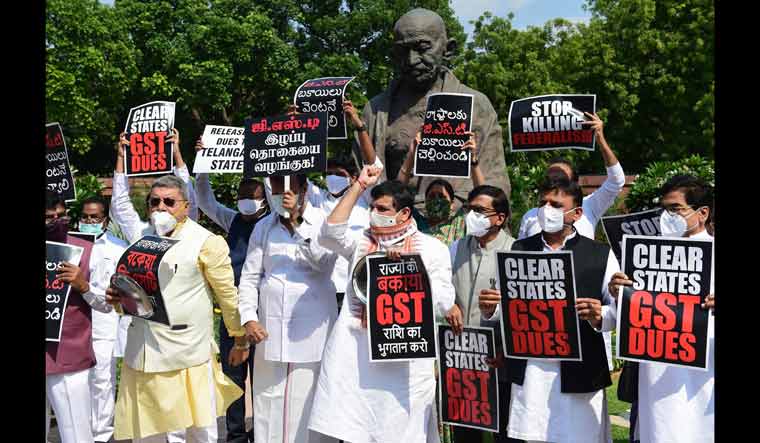In a sudden U-turn of sorts, the finance ministry on Thursday informed that it will borrow up to Rs 1.10 lakh crore on behalf of the states to bridge the shortfall in GST collections. The shift in stance came after the Reserve Bank of India expressed its reservations over states being asked to do so.
Earlier this week, the finance ministry had stated that 21 states have accepted the option to directly borrow from the market as suggested by the Centre. The borrowing options, however, were not acceptable to non-BJP-ruled states. That's when the Centre made a departure on Thursday.
“To meet the GST shortfall, RBI wanted the central government to borrow, not state governments. The view has been that the Centre can borrow at cheaper rates than states, at least 50 basis points cheaper. The RBI assured the Centre that it will manage the Centre’s borrowing in the best possible manner,” The Indian Express reported citing government officials. Government officials termed the new mechanism as being “administratively convenient”, with all states getting loans at a uniform interest rate, though they acknowledged that the new route was considered after the RBI showed its preference for the Centre to borrow to fund.
The urgency to tweak the norms and put in place the mechanism for borrowing also drew from the realisation that many states are in urgent need of funds, especially since only Rs 20,000 crore has been disbursed so far, while the shortfall stands at Rs 1.5 lakh crore till July. The threat of a legal challenge by a state also weighed in the discussions as the Centre decided to tweak its norms.
"Some of the states are likely to approach SC against discriminatory and illegal action of the Centre regarding the GST compensation. Kerala CM to chair a meeting of law, tax and finance departments and advocate general to take final decision on Kerala’s stance tomorrow afternoon," Kerala finance minister Thomas Isaac had stated on Thursday.
Soon, the Union finance ministry said states were offered a special window to borrow Rs 1.10 lakh crore over and above their existing limits, to bridge the shortfall. "Under the special window, the estimated shortfall of Rs 1.10 lakh crore (assuming all states join) will be borrowed by government of India in appropriate tranches," the statement said. "The amount so borrowed will be passed on to the states as a back-to-back loan in lieu of GST compensation cess releases," it added.
Later, Isaac tweeted welcoming the news. "I welcome the new announcement that Centre will borrow through special window and provide back to back loans to states in lieu of Compensation.But there is one issue yet to be resolved- how much of compensation is to be deferred to 2023? Negotiate this point and reach a consensus," he said, adding, "Provide full compensation payment of Rs 2.3 lakh crore this year itself. Since under the new arrangement additional borrowing does not affect the fiscal deficit of the Centre, why should it hesitate to borrow Rs 1.7 lakh crore instead of the present offer of Rs 1.1 lakh crore?"
The decision for the Centre to borrow instead of states and then provide back-to-back loans to states is being seen as the central government climbing down from its earlier position. But it will technically have no impact on the Centre’s fiscal deficit as the amounts will be reflected as capital receipts of state governments and as part of financing of its respective fiscal deficits.







